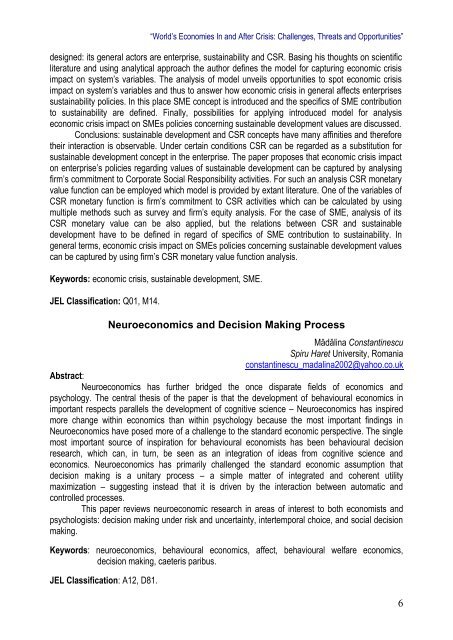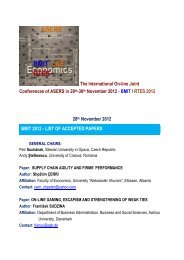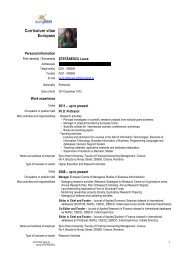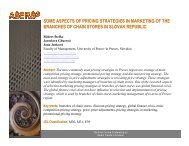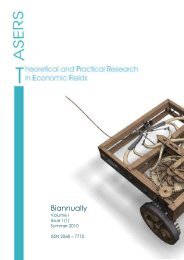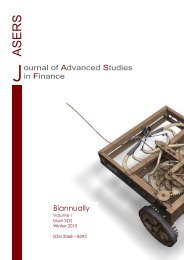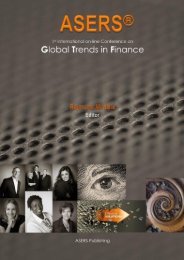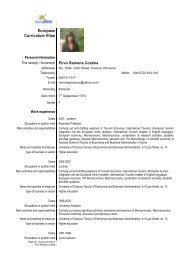eBook of Abstracts - ASERS
eBook of Abstracts - ASERS
eBook of Abstracts - ASERS
Create successful ePaper yourself
Turn your PDF publications into a flip-book with our unique Google optimized e-Paper software.
“World’s Economies In and After Crisis: Challenges, Threats and Opportunities”<br />
designed: its general actors are enterprise, sustainability and CSR. Basing his thoughts on scientific<br />
literature and using analytical approach the author defines the model for capturing economic crisis<br />
impact on system’s variables. The analysis <strong>of</strong> model unveils opportunities to spot economic crisis<br />
impact on system’s variables and thus to answer how economic crisis in general affects enterprises<br />
sustainability policies. In this place SME concept is introduced and the specifics <strong>of</strong> SME contribution<br />
to sustainability are defined. Finally, possibilities for applying introduced model for analysis<br />
economic crisis impact on SMEs policies concerning sustainable development values are discussed.<br />
Conclusions: sustainable development and CSR concepts have many affinities and therefore<br />
their interaction is observable. Under certain conditions CSR can be regarded as a substitution for<br />
sustainable development concept in the enterprise. The paper proposes that economic crisis impact<br />
on enterprise’s policies regarding values <strong>of</strong> sustainable development can be captured by analysing<br />
firm’s commitment to Corporate Social Responsibility activities. For such an analysis CSR monetary<br />
value function can be employed which model is provided by extant literature. One <strong>of</strong> the variables <strong>of</strong><br />
CSR monetary function is firm’s commitment to CSR activities which can be calculated by using<br />
multiple methods such as survey and firm’s equity analysis. For the case <strong>of</strong> SME, analysis <strong>of</strong> its<br />
CSR monetary value can be also applied, but the relations between CSR and sustainable<br />
development have to be defined in regard <strong>of</strong> specifics <strong>of</strong> SME contribution to sustainability. In<br />
general terms, economic crisis impact on SMEs policies concerning sustainable development values<br />
can be captured by using firm’s CSR monetary value function analysis.<br />
Keywords: economic crisis, sustainable development, SME.<br />
JEL Classification: Q01, M14.<br />
Neuroeconomics and Decision Making Process<br />
Mădălina Constantinescu<br />
Spiru Haret University, Romania<br />
constantinescu_madalina2002@yahoo.co.uk<br />
Abstract:<br />
Neuroeconomics has further bridged the once disparate fields <strong>of</strong> economics and<br />
psychology. The central thesis <strong>of</strong> the paper is that the development <strong>of</strong> behavioural economics in<br />
important respects parallels the development <strong>of</strong> cognitive science – Neuroeconomics has inspired<br />
more change within economics than within psychology because the most important findings in<br />
Neuroeconomics have posed more <strong>of</strong> a challenge to the standard economic perspective. The single<br />
most important source <strong>of</strong> inspiration for behavioural economists has been behavioural decision<br />
research, which can, in turn, be seen as an integration <strong>of</strong> ideas from cognitive science and<br />
economics. Neuroeconomics has primarily challenged the standard economic assumption that<br />
decision making is a unitary process – a simple matter <strong>of</strong> integrated and coherent utility<br />
maximization – suggesting instead that it is driven by the interaction between automatic and<br />
controlled processes.<br />
This paper reviews neuroeconomic research in areas <strong>of</strong> interest to both economists and<br />
psychologists: decision making under risk and uncertainty, intertemporal choice, and social decision<br />
making.<br />
Keywords: neuroeconomics, behavioural economics, affect, behavioural welfare economics,<br />
decision making, caeteris paribus.<br />
JEL Classification: A12, D81.<br />
6


